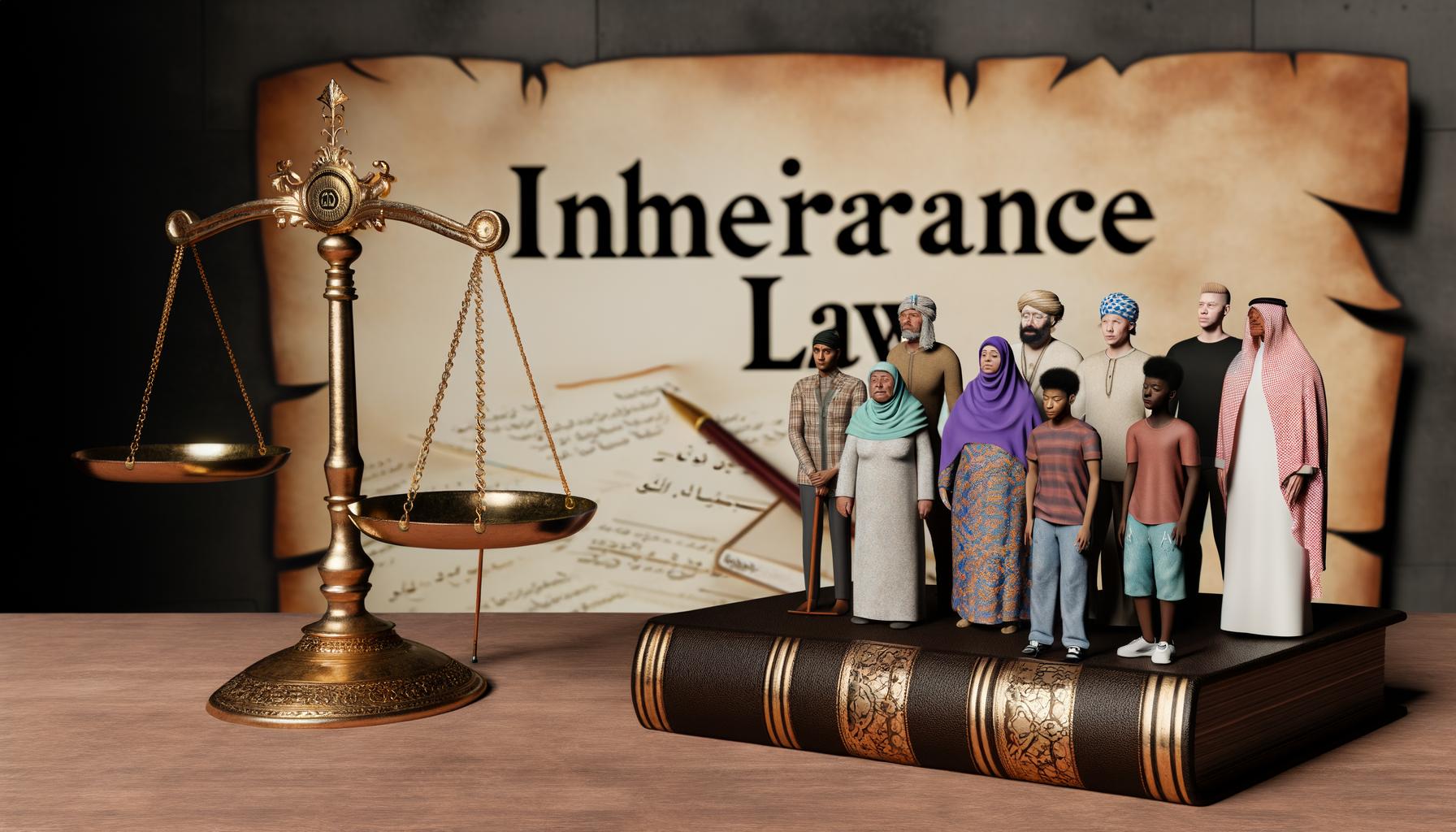Inheritance law governs the rules and regulations surrounding the distribution of a deceased person’s assets and properties. For residents of Laguna Hills, understanding inheritance law is crucial for ensuring that one’s estate is managed and passed on according to their wishes. Whether you’re preparing your own will or navigating the complexities of managing an inheritance, having a comprehensive grasp of this legal area can provide peace of mind and prevent potential disputes among heirs.
The importance of understanding inheritance law cannot be overstated, especially for those residing in Laguna Hills. The region has its own particularities and legal nuances that may influence how estates are handled. Being informed about these specific aspects helps residents make more informed decisions regarding their estate planning, ultimately safeguarding their assets and fulfilling their legacy goals.
Additionally, Laguna Hills has unique community characteristics that necessitate specialized knowledge in inheritance law. Estates in this area often include diverse assets like real estate, investments, and personal belongings that require careful consideration for smooth transfer upon one’s passing. By familiarizing themselves with local statutes and guidelines, Laguna Hills residents can ensure they are fully prepared to manage their estates effectively while minimizing potential legal challenges down the road.
Key Terms and Concepts in Inheritance Law
Inheritance law is a multifaceted subject, filled with specialized terms that are crucial for understanding how assets are transferred after death. For residents of Laguna Hills, grasping these key terms and concepts is essential to ensure proper estate planning and avoid potential legal conflicts. Below, we will define some of the most important terminology in inheritance law and explain their relevance specifically for those living in Laguna Hills.
Wills and Trusts: Foundational Documents
A will is a legal document that specifies how an individual’s assets and affairs should be managed and distributed upon their death. In contrast, a trust is an arrangement where a trustee holds assets on behalf of beneficiaries according to the instructions laid out by the trustor.
While both documents serve similar purposes-ensuring your wishes are honored-they operate differently. Wills typically become effective only after death following the probate process, whereas trusts can take effect immediately or continue functioning during your lifetime, providing more flexibility and control over asset management.
Probate: The Legal Validation
One concept often surrounded by confusion is probate-a court-supervised procedure ensuring that a deceased person’s will is authentic and their debts are paid before distributing assets to beneficiaries. For Laguna Hills residents, understanding the probate process can help mitigate unnecessary delays and expenses.
Probate involves validating the decedent’s will, appointing an executor to manage the process, inventorying the estate’s assets, paying debts or taxes owed by the estate, and finally distributing what remains to the intended beneficiaries.
Beneficiaries: Receiving What’s Intended for Them
Beneficiaries are individuals or entities designated in a will or trust to receive assets from an estate. In inheritance law lingo, they represent those who stand to gain from your careful planning. It’s crucial for Laguna Hills residents to clearly specify who their beneficiaries are to prevent any potential disputes among surviving family members or other interested parties. This clarity helps streamline both wills and trusts’ execution processes, ensuring loved ones benefit as intended without encountering significant obstacles.
Understanding these fundamental terms not only demystifies inheritance law but also equips Laguna Hills residents with necessary knowledge for sound estate planning decisions tailored to their specific needs within this unique locality.
Creating a Valid Will in Laguna Hills
To create a valid will in Laguna Hills, ensure that you meet the following criteria:
1. Legal Age: You need to be at least 18 years old.
2. Sound Mind: You must have the mental capacity to understand the implications of creating a will.
3. Written Document: Oral wills are not recognized; your intentions must be documented in writing.
4. Testator’s Signature: You need to sign the will yourself or direct someone else to do so in your presence if you cannot.
5. Witnesses: At least two witnesses, who are not beneficiaries of the will, must observe you signing it and then sign it themselves.
While it’s possible to draft a will on your own, consulting with an estate attorney is highly recommended. An experienced attorney can help navigate complex inheritance law issues and ensure that all elements of the will comply with legal standards. They can also assist in:
– Providing guidance on how to allocate assets among beneficiaries.
– Advising on how to handle any debts or taxes owed by the estate.
– Ensuring that provisions for care and guardianship of minor children are properly outlined.
In summary, creating a valid will involves more than simply jotting down who should inherit what; it requires meeting specific legal criteria and understanding inheritance law nuances within Laguna Hills. An estate attorney can be invaluable in this process, helping you craft a watertight document that reflects your true intentions while securing peace of mind for you and your loved ones.
The Probate Process Explained
The probate process in Laguna Hills serves as a judicial mechanism to authenticate wills, settle estate debts, and distribute assets to rightful beneficiaries. While it can seem daunting, understanding the probate process is crucial for both executors of estates and potential heirs. Probate starts with the validation of a deceased person’s will, if such a document exists.

If no will is present, the estate undergoes intestate succession under California’s inheritance law. Executors or administrators must file a petition with the local probate court to initiate this process.
In terms of timelines, probate in Laguna Hills can extend from several months to over a year, depending on the complexities involved. Factors such as contested wills, sizable estates with multiple creditors, and tax complications typically lengthen the process. Costs associated with probate can also vary.
Fees may include court filing charges, attorney fees, appraisal costs for real estate or other property valuations, and publication fees for public notices. Enlisting an estate attorney well-versed in local statutes can offer both compliance assurance and financial strategy.
Navigating the probate process efficiently demands attention to detail and meticulous documentation. Key parties involved include the executor or personal representative who manages oversights like asset liquidation and debt payment; beneficiaries who are eventually allocated their share of the estate; and creditors who need settlements from the deceased person’s liabilities. To ease through probate with minimal stress, Laguna Hills residents are advised to maintain organized records during their lifetime and communicate clearly about their wishes with family members.
| Factor | Detail |
|---|---|
| Timeline | Several months to over a year based on complexity |
| Costs | Court filing charges, attorney fees, appraisal costs |
| Main Parties Involved | Executor/Personal Representative, Beneficiaries, Creditors |
Trusts
Laguna Hills residents often find trusts to be a superior alternative to wills for various reasons. Trusts provide more privacy, as they are not subject to the same public probate process that wills must go through. These legal arrangements can be crafted in several ways, with each type offering unique benefits and considerations.
A revocable trust, for example, allows the grantor to maintain control over their assets during their lifetime while specifying terms for distribution upon death. On the other hand, an irrevocable trust relinquishes control from the grantor but offers substantial tax advantages and protection from creditors.
To understand which type of trust is best suited for your situation, it’s essential to explore the practical applications and specific scenarios where trusts might be preferable. For instance, if you have a sizable estate or family business in Laguna Hills that you wish to pass down without undergoing probate, establishing a trust could simplify this transfer drastically.
Trusts also offer flexibility in managing assets for beneficiaries who may not yet have the financial acumen or legal capacity to handle significant inheritances responsibly.
Incorporating trusts into your estate planning strategy can also help mitigate potential legal disputes among heirs. Through detailed stipulations within the trust agreement, you can outline clear instructions for asset distribution that aligns closely with your wishes and reduces ambiguity. Moreover, using both wills and trusts together could create a comprehensive plan that affords numerous benefits under local inheritance law while ensuring all aspects of your estate are covered comprehensively.
| Trust Type | Benefit |
|---|---|
| Revocable Trust | Maintains control during lifetime |
| Irrevocable Trust | Tax advantages and creditor protection |
Legal Guardianship for Minors and Dependents
When creating an estate plan, one of the most crucial elements for parents in Laguna Hills is naming a legal guardian for minors and dependents. This decision ensures that your children will be cared for by someone you trust if you are no longer able to do so.
Under inheritance law, failing to designate a guardian may leave the decision in the hands of the court, which could lead to outcomes that do not align with your wishes. Therefore, taking proactive steps in this area is vital.
The Process and Criteria for Choosing a Guardian
Choosing a guardian involves several important considerations. Not only should the selected individual be someone who shares your values and parenting style, but they must also be willing and able to take on the responsibility.
It’s crucial to have a candid conversation with potential guardians to ensure they are committed and prepared to care for your dependents. Inheritance law requires that guardians meet specific legal criteria, such as being adults of sound mind; understanding these requirements will help you make an informed decision.
The Legal Responsibilities of a Guardian in Laguna Hills
A named guardian carries significant responsibilities that go beyond providing basic daily care. They are responsible for making critical decisions regarding education, healthcare, and overall welfare under the ambit of local laws. For residents of Laguna Hills, it’s essential to recognize how California state laws will influence these duties. Engaging an estate attorney can offer clarity on how inheritance law affects guardianship roles and ensure all documents are correctly filed with relevant authorities.
Implementing these steps ensures that your guardianship arrangements align seamlessly with your broader estate planning objectives. By navigating these complexities thoughtfully, you safeguard not only the physical well-being but also the financial future of your minor children or dependents within Laguna Hills’ jurisdictional framework.
Inheritance Tax Implications
To mitigate potential tax liabilities, strategic planning is crucial. One effective method is to make use of annual gift exclusions. For instance, you can gift up to $15,000 annually per recipient without it counting towards your lifetime gift tax exemption.

This not only reduces the size of your taxable estate but also allows you to distribute wealth during your lifetime in a controlled manner. Additionally, charitable donations can offer significant deductions against your estate’s taxable value while supporting causes important to you.
Special consideration must also be given to capital gains taxes on inherited property. Typically, beneficiaries receive what is known as a “step-up” in basis for property they inherit; this means that the property’s value is reset at its current market value upon transfer rather than its original purchase price.
This step-up effectively minimizes capital gains tax if the beneficiary decides to sell the property soon after inheriting it. Therefore, incorporating these strategies within your inheritance planning can help manage and potentially reduce tax burdens.
| Tax Strategy | Benefit |
|---|---|
| Annual Gift Exclusion | Reduces size of taxable estate without incurring taxes |
| Charitable Contributions | Significant deductions against taxable estate value |
| Step-Up in Basis for Inherited Property | Minimizes capital gains tax upon sale by beneficiary |
Estate Planning Best Practices
When it comes to estate planning best practices, the first step for Laguna Hills residents is to take an inventory of all your assets. This includes not only tangible assets like real estate, vehicles, and jewelry but also intangible assets such as stocks, bonds, and intellectual property. Creating a comprehensive list ensures nothing is overlooked during the planning process.
1. Take Inventory of Assets:
Regularly updating your estate plans is crucial in maintaining their relevance and effectiveness. Life events such as marriages, divorces, births, or deaths can significantly impact your wishes and legal directives. A periodic review every three to five years-or immediately following a major life event-ensures that everything aligns with your current circumstances and changes in inheritance law.
2. Update Plans Regularly:
Consulting with an experienced estate attorney from Laguna Hills can make the entire process smoother and legally sound. An attorney can offer invaluable guidance on complex matters such as trusts versus wills or navigating probate laws specific to California. They can also help mitigate potential tax liabilities that might arise from inheriting property.
3. Benefits of Consulting an Attorney:
Incorporating these estate planning best practices will not only protect your legacy but also offer peace of mind knowing that you have taken meaningful steps to secure the future for yourself and your loved ones under Laguna Hills’ inheritance law framework.
Common Mistakes and How to Avoid Them
When it comes to inheritance planning, one of the most common mistakes Laguna Hills residents make is failing to draft or update a will. A significant number of individuals either put off making a will until it’s too late or forget to revise it as circumstances change.
For example, major life events like marriage, divorce, the birth of children, or acquiring new assets necessitate updates to your will. Without a current and valid will, your estate may end up in probate court for an extended period, causing undue stress and financial burden on your loved ones.
Another frequent pitfall involves misunderstanding the differences between wills and trusts. While both instruments serve important roles in estate planning, they do so in distinct ways. Wills take effect only after death and go through the probate process, which can be time-consuming and costly.
Trusts, especially revocable living trusts, start working immediately upon creation and can help avoid probate altogether. To avoid confusion and ensure proper asset distribution, it’s wise to consult with an attorney who specializes in inheritance law. They can guide you in selecting and setting up the best instruments tailored to your specific needs.
Lastly, overlooking tax implications can severely impact the value of your inherited assets. Both state and federal taxes can substantially diminish what beneficiaries receive if not properly planned for. Strategies such as gifting assets while still alive or setting up tax-efficient trusts can mitigate these liabilities. Here’s a quick list of steps you can follow:
1. Consult an expert: Engage an estate planning attorney familiar with Laguna Hills’ specific laws.
2. Regular updates: Review and update your estate plan regularly.
3. Understand taxes: Be aware of both state and federal tax obligations.
4. Choose instruments wisely: Use wills for simple heir designations but consider trusts for more complex scenarios.
By being proactive about these aspects of inheritance law and taking preventive measures, Laguna Hills residents can bypass common mistakes that otherwise lead to complications down the line.
Resources for Laguna Hills Residents
Navigating inheritance law can be a complex process, but fortunately, several resources are available to help residents of Laguna Hills ensure they manage their estates effectively. Accessing the right guidance and tools can make the difference in securing your family’s future.
Local Estate Planning Attorneys
Consulting with an estate planning attorney who specializes in inheritance law is invaluable. Laguna Hills is home to numerous legal professionals who can help you draft wills, create trusts, and navigate probate proceedings. These experts have a deep understanding of both state laws and local regulations that could impact your estate plans. Working with a knowledgeable attorney can provide peace of mind and ensure that all legal requirements are met properly.

Probate Court Resources
The Orange County Superior Court, located near Laguna Hills, handles probate cases for the region. Visiting the probate court’s official website offers a wealth of information about filing procedures, required documents, and pertinent deadlines. There are also self-help centers available that can provide general guidance regarding probate matters and other relevant aspects of inheritance law.
Community Support Services
Beyond legal professionals and courts, various organizations offer support services related to estate planning. The Council on Aging – Southern California provides resources specifically tailored to seniors, including workshops on financial planning and elder law education. Additionally, non-profit groups like Community Legal Aid SoCal offer free or low-cost assistance to residents needing help with estate-related issues.
Finding reputable resources in Laguna Hills ensures you are well-prepared to handle inheritance law matters efficiently. Being proactive in utilizing these local tools will lay the groundwork for a secure legacy for you and your loved ones.
Conclusion
In conclusion, understanding inheritance law is crucial for Laguna Hills residents who wish to secure their legacy and ensure their assets are distributed according to their wishes. Whether you’re drafting your first will or updating an existing estate plan, knowing the nuances of wills, trusts, probate processes, and tax implications can make a significant difference.
These elements not only protect your financial legacy but also provide peace of mind that your loved ones will be well taken care of when you’re no longer around.
Proactively engaging in estate planning is essential. Regularly updating your plans to reflect changes in personal circumstances or legislative adjustments ensures they remain valid and effective. Working with a qualified estate attorney familiar with Laguna Hills’ specific legal landscape can provide invaluable guidance, helping you navigate complexities and avoid common pitfalls associated with inheritance law.
Finally, leveraging local resources and professional support allows you to craft a comprehensive and personalized plan that aligns with your goals. By taking these steps today, Laguna Hills residents can secure a lasting legacy that provides for their families’ futures while honoring their own financial intentions and ensuring compliance with relevant laws. Prioritize your estate planning now to safeguard both current peace of mind and future security for yourself and those you care about most.
Frequently Asked Questions
What Is the Inheritance Law in Us?
In the United States, inheritance law varies significantly across different states, but it generally governs the distribution of a deceased person’s assets. This can be based on a will, where an individual specifies how their estate should be distributed, or through intestate succession laws if there is no will.
These laws detail who inherits what portion of the estate and in what order of priority. Federal considerations may also apply for tax purposes, but the core rules concerning inheritance distribution are determined at the state level.
Who Has the Right to Inheritance?
The right to inheritance typically includes a decedent’s close relatives such as spouses, children, and sometimes parents and siblings, depending on whether there is a valid will or if intestate succession laws apply. A person named in a legally valid will has the right to inherit according to its terms.
If no will exists or part of an estate falls outside its scope, state intestacy laws dictate who inherits property, usually prioritizing spouses and children first.
What Are the Three Basic Laws of Inheritance?
Three basic principles often referred to within inheritance law are testamentary freedom, laws governing intestate succession, and community property principles in certain states. Testamentary freedom allows individuals to distribute their assets as they see fit through a will.
Intestate succession laws outline who inherits property when there is no will or when part of an estate isn’t covered by one. In community property states, half of all marital property automatically goes to the surviving spouse upon death unless otherwise specified in a legally binding document.
Do I Automatically Inherit My Parents’ House?
Automatically inheriting your parents’ house depends on several factors including whether your parent left a valid will naming you as an heir or if you reside in a state that recognizes joint tenancy with rights of survivorship.
In cases without explicit direction from a legal document like a will or trust agreement outlining specific wishes for the home, state intestacy laws come into play which typically favor distributing to closest living relatives such as spouses or children.
What Are the Rules of Inheritance?
The rules of inheritance cover aspects like recognizing legally valid wills whereby individuals articulate their asset distribution plans posthumously; determining appropriate heirs under various circumstances dictated by state-specific legislation; adhering to federal and administrative regulations regarding taxes imposed during transfers; ensuring proper execution processes involved during probate proceedings are managed efficiently; protection provisions exist safeguarding legitimate claims against contested estates minimizing fraudulent activities associated therein reducing misunderstanding/uncertainties among potential beneficiaries thus preserving integrity throughout execution phase ensuring compliance with prescribed legal mandates reflecting equitable resolution ever possible fostering stability/upholding publicly endorsed ethical standards promoting overall societal welfare preservation through diligent administration prudently executed secured mechanism restoring confidence enhancing predictability inevitability transition period results effectively stabilizing subsequent generations thereafter!

